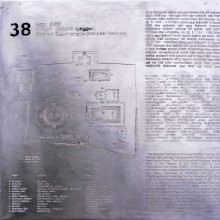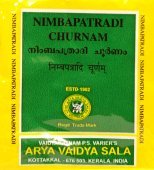Nish, Niśā, Niś, Niśa, Ṅīṣ, Nisā, Niṣ, Nishe, Nisha, Nisa: 19 definitions
Introduction:
Nish means something in Hinduism, Sanskrit, Hindi, biology. If you want to know the exact meaning, history, etymology or English translation of this term then check out the descriptions on this page. Add your comment or reference to a book if you want to contribute to this summary article.
Nish has 18 English definitions available.
The Sanskrit terms Niśā and Niś and Niśa and Ṅīṣ and Niṣ can be transliterated into English as Nisa or Nisha or Nis or Nish, using the IAST transliteration scheme (?).
Images (photo gallery)
Languages of India and abroad
Sanskrit dictionary
[Deutsch Wörterbuch]
Source: Cologne Digital Sanskrit Dictionaries: Böhtlingk and Roth Grosses Petersburger WörterbuchNiś (निश्):—1. , neśati sich vertiefen (samādhau) [DHĀTUP. 17, 73.]
--- OR ---
Niś (निश्):—2. f. = niśā Nacht: in den starken Casus nicht im Gebrauch nach [Pāṇini’s acht Bücher 6, 1, 63.] [Vopadeva’s Grammatik 3, 39, 76.] niśas (acc. pl.), niśā, niḍbhyām [Pāṇini’s acht Bücher, Scholiast] auch nijbhyām (!) nicsu(!) [Siddhāntakaumudī] niśi [Kauśika’s Sūtra zum Atuarvaveda 39. 75. 141.] [Manu’s Gesetzbuch 9, 60. 11, 92. 118.] [Indralokāgamana 5, 18.] [Hiḍimbavadha 1, 3.] [Mahābhārata 5, 7248.] [Śākuntala 61.] [Varāhamihira’s Bṛhajjātaka S. 4, 30. 34, 5. 87, 21. 92, 5.] niśi niśi jede Nacht [5, 9.] [Geschichte des Vidūṣaka 37. 278.] mahāniśi in tiefer Nacht [Manu’s Gesetzbuch 4, 129.] dyuniśoḥ 25. tamāniśau [Trikāṇḍaśeṣa 1, 1, 105.] niṭ [Hemacandra’s Abhidhānacintāmaṇi 17.] niśaḥ (abl. sg.) [Hemacandra’s Abhidhānacintāmaṇi 105.]
--- OR ---
Niṣ (निष्):—, neṣati benetzen, besprengen [DHĀTUP. 17, 49.]
--- OR ---
Nis (निस्):—
Source: Cologne Digital Sanskrit Dictionaries: Sanskrit-Wörterbuch in kürzerer FassungNiś (निश्):—1. , neśati ( samādhau).
--- OR ---
Niś (निश्):—2. f. Nacht. Zu belegen nur niśi , niśas (Abl.) , niśau und niśos ([219,22]). Vgl. dyuniś.
--- OR ---
Niṣ (निष्):—, niṣati (secane).
--- OR ---
Nis (निस्):—Adv. Praep. hinaus , aus , weg von (Abl.). Selbständig nur hier und da im [Atharvaveda] Häufig in Zusammensetzung mit einem Nomen und zwar —
1) als Präposition , von der das folgende Wort abhängig gedacht wird. —
2) als Adv. — a) der folgende Begriff wird einfach negirt: nirapekṣā f. als Gegensatz von apekṣā — b) der folgende Begriff wird an einem andern Begriff negirt: nirmala Adj. an dem keine Flecken sind. — c) verstärkt den folgenden Begriff (durchaus , ganz und gar) in niṣkevala u.s.w.
Sanskrit, also spelled संस्कृतम् (saṃskṛtam), is an ancient language of India commonly seen as the grandmother of the Indo-European language family (even English!). Closely allied with Prakrit and Pali, Sanskrit is more exhaustive in both grammar and terms and has the most extensive collection of literature in the world, greatly surpassing its sister-languages Greek and Latin.
See also (Relevant definitions)
Starts with (+1302): Nihshanka, Nihshesha, Nihshreyasa, Nihshvasya, Nihsidh, Nihspanda, Nikcakrika, Nikcalanga, Nikcamara, Nikcarayitavya, Nikcat, Nikcatvarimsha, Nikcaura, Nikcayat, Nikcayena, Nikcetavya, Nikcheda, Nikcikramisha, Nikcitam, Nikcrit.
Ends with: Burnish, Dead finish, Dinanish, Dyunish, Kawanish, Kornish, Kunish, Mahanish, Manish, Munish, Nemanish, Piney varnish, Rajanish, Rianish, Ushnish, Varnish.
Full-text (+2509): Nisa, Nishanisham, Nishahva, Pratinisham, Mahanisha, Nishata, Nishabala, Nishanta, Nishachada, Ardhanisha, Nishavedin, Nishatana, Nishabhanga, Nishamriga, Nisharatna, Nishesha, Nishoshita, Nishamani, Nishavasana, Nishaita.
Relevant text
Search found 72 books and stories containing Nish, Niśā, Niś, Niśa, Ṅīṣ, Nisā, Niṣ, Nishe, Nisha, Nisa, Nise, Ṇisā, Ni-sha, Ni-śā, Ṇis, Nīsa, Ṇiṣ, Ṇiś, Nis, Ṇisa, Niṣa, Ni-sa, Niśe, Niṣā; (plurals include: Nishes, Niśās, Niśs, Niśas, Ṅīṣs, Nisās, Niṣs, Nishas, Nisas, Nises, Ṇisās, shas, śās, Ṇises, Nīsas, Ṇiṣs, Ṇiśs, Ṇisas, Niṣas, sas, Niśes, Niṣās). You can also click to the full overview containing English textual excerpts. Below are direct links for the most relevant articles:
A fragment of the Babylonian 'Dibbara' epic (by Morris Jastrow)
Garga Samhita (English) (by Danavir Goswami)
Verse 6.17.35 < [Chapter 17 - Śrī Śrī Rādhā and Kṛṣṇa Meet at Siddhāśrama and the Nature of Śrī Rādhā’s Love Is Revealed]
Verse 6.21.7 < [Chapter 21 - In the Description of the Third Fort, the Glories of Piṇḍāraka-tīrtha]
Verse 6.21.1 < [Chapter 21 - In the Description of the Third Fort, the Glories of Piṇḍāraka-tīrtha]
Jivanandana of Anandaraya Makhin (Study) (by G. D. Jayalakshmi)
Analysis of Utprekṣā-alaṅkāra < [Chapter 6 - Dramatic aspects of the Jīvanandana Nāṭaka]
Vakyapadiya of Bhartrihari (by K. A. Subramania Iyer)
Verse 3.14.411 < [Book 3 - Pada-kāṇḍa (14): Vṛtti-samuddeśa (On Ccomplex Formation)]
Verse 3.14.410 < [Book 3 - Pada-kāṇḍa (14): Vṛtti-samuddeśa (On Ccomplex Formation)]
Verse 3.14.177 < [Book 3 - Pada-kāṇḍa (14): Vṛtti-samuddeśa (On Ccomplex Formation)]
Sahitya-kaumudi by Baladeva Vidyabhushana (by Gaurapada Dāsa)
Text 10.275 < [Chapter 10 - Ornaments of Meaning]
Text 10.174 < [Chapter 10 - Ornaments of Meaning]
Text 7.135 < [Chapter 7 - Literary Faults]
The Bhikkhus Rules (by Bhikkhu Ariyesako)
Right Livelihood < [Appendix B]
Bowls And Other Requisites < [Appendix B]
Money < [Chapter 3 - Possessions And Offerings]
Related products
(+10 more products available)










